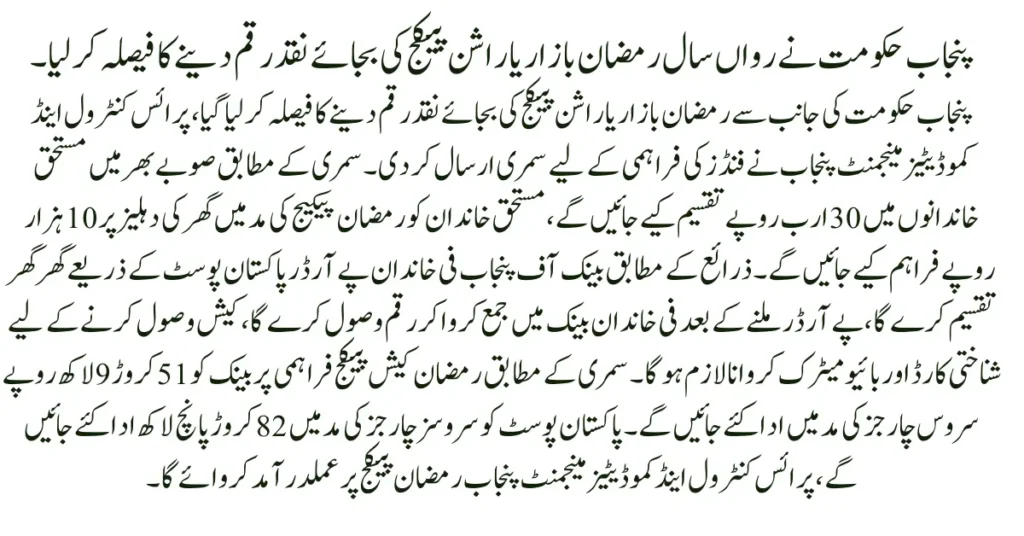Table of Contents
Punjab Introduces Rs 10,000 Cash Assistance
Punjab Introduces Rs 10,000 Cash Assistance. As the holy month of Ramadan approaches, the Punjab government has introduced a new and innovative initiative aimed at providing relief to the province’s underprivileged families. This year, instead of the traditional ration packages, the government has decided to distribute Rs 10,000 in cash to deserving families, allowing them to manage their needs during this special time of the year. This move is expected to offer much-needed financial assistance, particularly for those struggling to meet daily expenses during Ramadan.
Key Features of the Cash Assistance Scheme
The Punjab government’s decision to replace the usual Ramadan relief package with cash assistance is a significant step in supporting the poor and needy families across the province. Under this new plan, each eligible family will receive a cash sum of Rs 10,000. This initiative aims to provide families with the freedom to purchase whatever they need during Ramadan, whether it’s food, clothing, or other essential items.
In total, the Punjab government has allocated a whopping Rs 30 billion for this cash assistance scheme, ensuring that families in every corner of the province benefit from this relief. The aim is to reduce financial strain during Ramadan, a time when families often face increased demands for food and other necessities.

PM New Youth Loan Scheme to Provide Support for Laptops
Why Cash Assistance Over Ration Packages?
One of the standout features of this new initiative is the shift from ration packages to cash assistance. Traditionally, the Punjab government would distribute food packages containing essential items like flour, rice, and cooking oil. However, this year’s decision to provide cash instead of a pre-packaged set of items gives families the flexibility to purchase what they need the most.
This flexibility is especially valuable, as families may have varying needs based on dietary preferences, health conditions, or other personal circumstances. By giving them the freedom to make their own purchases, the government is not only providing financial support but also empowering families to meet their specific needs in a way that works best for them.
How the Cash Will Be Distributed
The distribution of cash to eligible families will be handled by the Bank of Punjab and Pakistan Post. These two institutions have been tasked with ensuring that the money reaches the right hands securely. To do so, the Punjab government has set up a robust process that will use pay orders for cash transfers.
After receiving the pay order, the eligible individual will need to visit their designated bank branch to collect the cash. In order to ensure transparency and prevent any misuse of the funds, the recipients will undergo biometric verification and provide an ID card at the bank. This process is designed to guarantee that the money reaches only those who are eligible and prevents any fraudulent activity.
Ehsaas 8171 Program New Payment Verification Update 2025
Service Charges for Implementing the Scheme
To ensure smooth execution and timely disbursement of funds, the Punjab government has also allocated service charges to the institutions involved in this program. The Bank of Punjab will receive Rs 519 million for its role in managing the distribution, while Pakistan Post will be provided with Rs 825 million. These charges will cover the operational costs and ensure the program runs efficiently and securely.
While this expenditure may seem large, it’s essential to remember that these funds are being used to facilitate the fair and timely delivery of much-needed assistance to millions of deserving families across the province. The allocation of service charges helps guarantee that the entire process is handled professionally and that the distribution is both transparent and effective.
Impact on Families and the Community
This Ramadan cash assistance scheme is a game-changer for many families in Punjab, particularly those who have long struggled with the burden of meeting daily needs. With the cost of living rising, especially during Ramadan, this cash aid offers significant relief.
Instead of worrying about where their next meal will come from or how they will afford essential items for the month of fasting, families can now focus on their spiritual journey and religious obligations. By providing financial support in the form of cash, the government is offering a helping hand to make this Ramadan a little easier for the province’s most vulnerable communities.
Physical Disability Is No Longer A Constraint Punjab Himmat Card
Transparency and Security Measures
One of the key concerns with any large-scale cash distribution program is ensuring transparency and security. The Punjab government has addressed this by using biometric verification and ID card checks at the Bank of Punjab. This ensures that the right individuals receive the assistance and that no funds are misappropriated.
The use of pay orders and strict identification checks also adds an extra layer of security to the entire process. The goal is to make sure that every deserving family gets the support they need without any delays or complications.
Conclusion
The Punjab government’s decision to replace the traditional Ramadan relief package with a cash distribution scheme reflects a deep understanding of the challenges faced by the province’s poor and needy families. This initiative not only provides financial relief but also empowers families to make their own purchasing decisions, ensuring that they can meet their specific needs during the holy month.
By implementing a transparent, secure, and efficient distribution system, the Punjab government is setting a new standard for welfare programs in the region. This step is not just about offering temporary relief; it’s a reflection of the government’s commitment to improving the lives of its citizens in meaningful ways.
As Ramadan draws closer, this cash assistance initiative will undoubtedly bring much-needed hope and support to families across Punjab, allowing them to focus on their spiritual obligations without the added stress of financial burdens. The success of this project will set a positive example for future welfare initiatives, ensuring that the people of Punjab are always prioritized in times of need.
